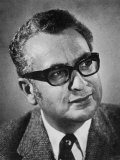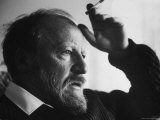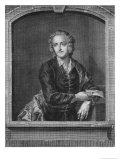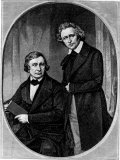|
|
|
Murray Gell-Mann
b. 9-15-1929; New York City, NY
Gell-Mann is a physicist and professor whose work involved elementary particles, quantum number, quark model, and the study of complexity. In 1984 Gell-Mann co-founded the Santa Fe Institute to study complex systems and disseminate the notion of a separate interdisciplinary study of complexity theory.
Murray Gell-Mann was awarded the 1969 Nobel Prize in Physics “for his contributions and discoveries concerning the classification of elementary particles and their interactions”.
Murray Gell-Mann quotes ~
• “For me, the study of these laws is inseparable from a love of Nature in all its manifestations.”
• “We are driven by the usual insatiable curiosity of the scientist, and our work is a delightful game.”
• “Sometimes the probabilities are very close to certainties, but they're never really certainties.”
• “Today the network of relationships linking the human race to itself and to the rest of the biosphere is so complex that all aspects affect all others to an extraordinary degree. Someone should be studying the whole system, however crudely that has to be done, because no gluing together of partial studies of a complex nonlinear system can give a good idea of the behavior of the whole.”
• “Of course the word chaos is used in rather a vague sense by a lot of writers, but in physics it means a particular phenomenon, namely that in a nonlinear system the outcome is often indefinitely, arbitrarily sensitive to tiny changes in the initial condition.”
• “What is especially striking and remarkable is that in fundamental physics a beautiful or elegant theory is more likely to be right than a theory that is inelegant.”
• "In 1963, when I assigned the name “quark” to the fundamental constituents of the nucleon, I had the sound first, without the spelling, which could have been “kwork.” Then, in one of my occasional perusals of Finnegans Wake, by James Joyce, I came across the word “quark” in the phrase “Three quarks for Muster Mark.” Since “quark” (meaning, for one thing, the cry of a gull) was clearly intended to rhyme with “Mark,” as well as “bark” and other such words, I had to find an excuse to pronounce it as “kwork.” But the book represents the dreams of a publican named Humphrey Chimpden Earwicker. Words in the text are typically drawn from several sources at once, like the “portmanteau words” in Through the Looking Glass. From time to time, phrases occur in the book that are partially determined by calls for drinks at the bar. I argued, therefore, that perhaps one of the multiple sources of the cry “Three quarks for Muster Mark” might be “Three quarts for Mister Mark,” in which case the pronunciation “kwork” would not be totally unjustified. In any case, the number three fitted perfectly the way quarks occur in nature.”— (The Quark and the Jaguar: Adventures in the Simple and the Complex)
• The Eightfold Way
|
|
|
|
|
|
|
“Nikki” Giovanni
née Yolande Cornelia
b. 6-7-1943; Knoxville, TN
Poet and activist Nikki Giovanni has taught English at Virginia Tech since 1987. In 2004 Giovanni was nominated for the Grammy Award for Best Spoken Word Album.
Nikki Giovanni quote ~
• “I really don't think life is about the I-could-have-beens. Life is only about the I-tried-to-do. I don't mind the failure but I can't imagine that I'd forgive myself if I didn't try.”
• “Mistakes are a fact of life. It is the response to the error that counts.”
|
|
|
|
Édouard Glissant
b. 9-21-1928; Martinique
d. 2-3-2011; Paris, France
Édouard Glissant, a French writer, poet and literary critic, is widely recognised as being one of the most influential figures in Caribbean thought and cultural commentary.
Glissant had been visiting professor of French Literature at CUNY since 1995, and the president of France's cultural center devoted to the history of slave trade since 2006.
Édouard Glissant quote ~
•“The author must be demythifies, certaily, because he must be integrated into a common resolve. The collective ‘we’ becomes the site of the generative system, and the true subject.”
|
|
|
|
|
|
|
William Golding
b. 9-19-1911; Cornwall, England
d. 6-19-1993; England (heart failure)
Novelist, poet and playwright William Golding, most remembered for his novel Lord of the Flies, was awarded the Nobel Prize in Literature in 1983 for “for his novels which, with the perspicuity of realistic narrative art and the diversity and universality of myth, illuminate the human condition in the world of today.”, also taught English and Philosophy as well as serving as a writer-in-residence.
FYI - He also commanded a land craft in the invasion of Normandy on D-Day and recommended that James Lovelock call his theory “Gaia” after the goddess of the Earth.
|
|
|
|
|
|
|
The Brothers Grimm
Jacob
b. 1-4-1785 - d. 9-20-1863;
Wilhelm
b. 2-24-1786 - d. 12-16-1859
Hanau, Germany
The Grimm Brothers were philologists, combinating the study of literary criticism, history, and linguistics from written historical sources. Though beginning their university studies with law (following their father) the brothers are best known for transcribing and preserving the tales of the peasant classes.
The brothers are also considered as precursors of the German democratic movement. In 1837, they and five of their fellow professors, known as the Göttinger Sieben (The Göttingen Seven), were dismissed from their positions for accusing King Ernest Augustus of Hanover as violating the constitution. (FYI - Ernest Augustus was the uncle of Victoria, who became queen of England in 1837).
• Grimms' Tales for Young and Old: The Complete Stories
|
|
|
|
Alfred Whitney Griswold
b. 10-27-1906; Morristown, NJ
d. 4-19-1963; New Haven, CT
Historian and professor Alfred Whitney Griswold wrote his dissertation on the American cult of success. He was also was president of Yale University 1951-1963.
FYI - Griswold was a descentant of Eli Whitney.
Alfred Whitney Griswold quote ~
• “In the long run of history, the censor and the inquisitor have always lost. The only sure weapon against bad ideas is better ideas. The source of better ideas is wisdom.”
|
|
|













